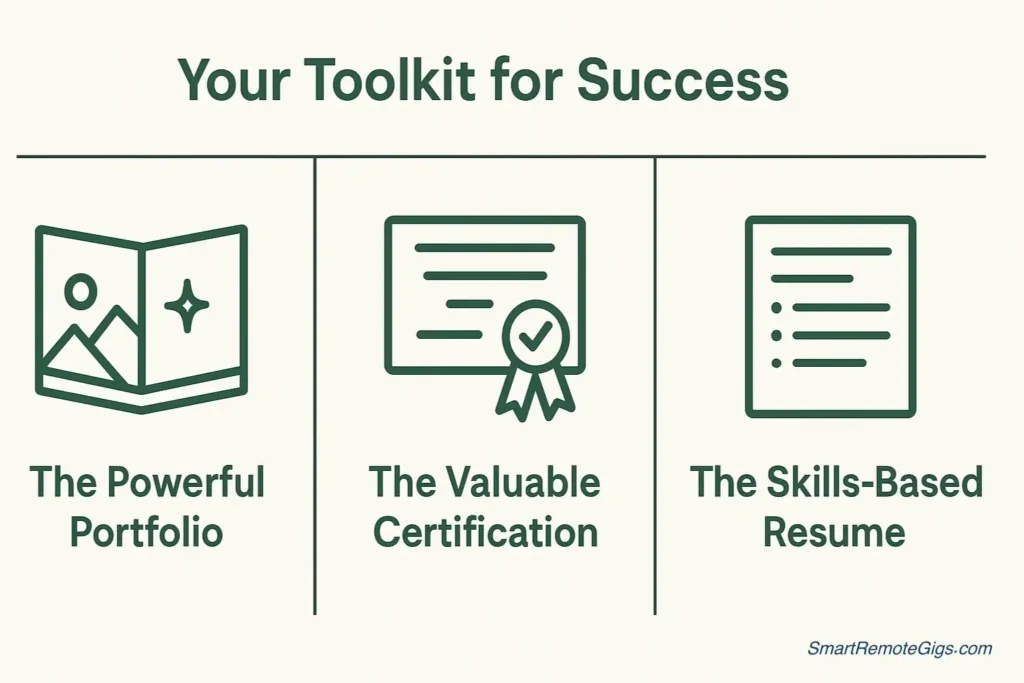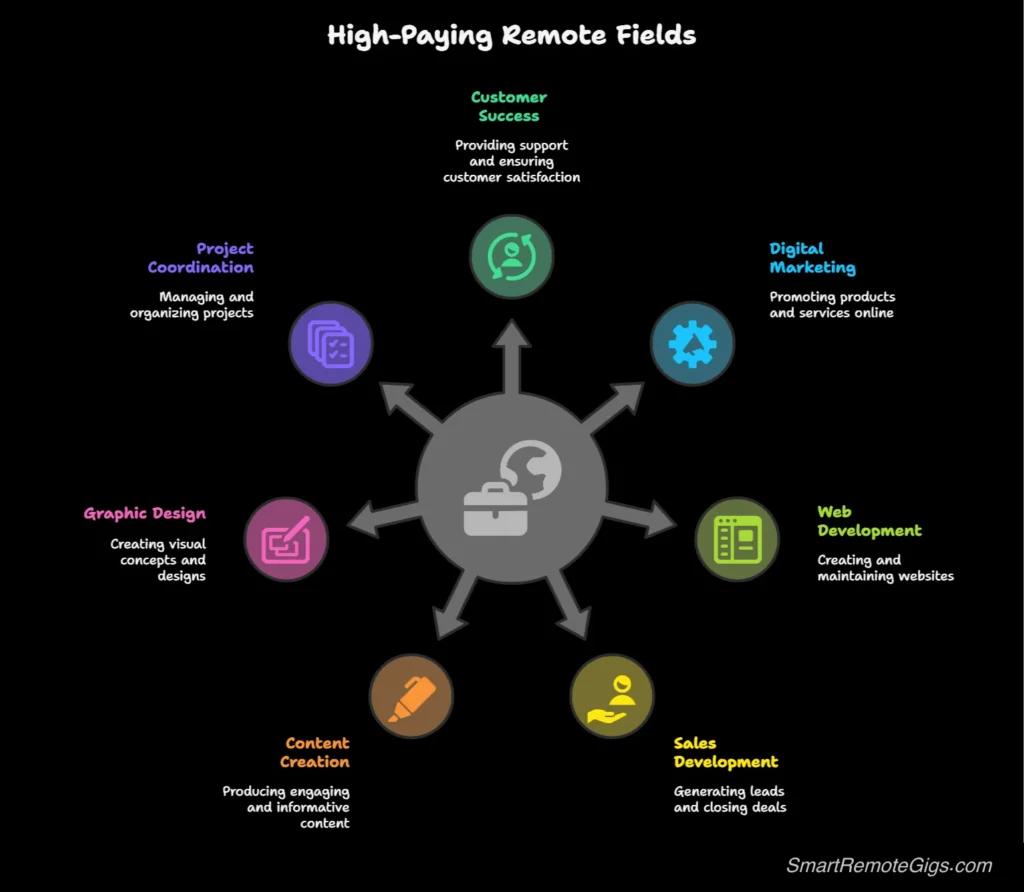The question keeps you up at night: Can you really build a successful career in remote jobs no degree required? You scroll through job postings, see “Bachelor’s degree preferred,” and feel that familiar sinking feeling. But here’s what the job boards won’t tell you—the remote work revolution has fundamentally changed what employers actually value.
The truth is refreshing: many of today’s best work from home no college opportunities prioritize demonstrable skills, proven results, and cultural fit over traditional credentials. Companies have learned that a diploma doesn’t guarantee success in remote work, while the right skills and mindset almost always do.
This guide will show you exactly how to get a job without a degree by leveraging the skills over degrees approach that’s reshaping remote hiring. You’ll discover proven strategies, build confidence in your existing abilities, and create a roadmap to landing the remote job you deserve.
The Big Question: Do You Really Need a Degree for Remote Work?
For many of the best remote jobs, the answer is no.
The shift toward remote work has exposed a fundamental truth that traditional hiring practices often missed: academic credentials don’t predict remote work success. Companies that embrace remote teams have discovered that the most valuable employees possess qualities that can’t be taught in a classroom.
Problem-solving ability matters more than theoretical knowledge when you’re troubleshooting customer issues from your home office. Communication skills become paramount when your entire relationship with colleagues happens through screens and keyboards. Self-discipline and time management prove more valuable than any degree when there’s no supervisor looking over your shoulder.
Remote companies have also realized that degree requirements artificially limit their talent pool. By focusing on skills and results instead, they can access motivated individuals who bring fresh perspectives and often demonstrate higher levels of commitment than their degree-holding counterparts.
The hiring landscape has fundamentally shifted. Companies like Google, IBM, and Apple have publicly removed degree requirements from many positions, recognizing that skills over degrees produces better hires. This trend is even more pronounced in remote work, where results speak louder than credentials.
The “Skills-First” Mindset: Your New Strategy
The key to landing remote jobs no degree lies in reframing how you view your background. Every experience you’ve had—whether paid employment, volunteer work, personal projects, or life challenges—has equipped you with transferable skills that employers value.

Your experience already contains valuable skills. The problem isn’t lacking qualifications; it’s not recognizing and articulating the skills you’ve already developed. Remote employers care about what you can do, not where you learned to do it.
Consider this skills translation framework:
| If You’ve Done This… | You Have This Skill | Remote Job Application |
|---|---|---|
| Managed household budgets | Financial analysis & planning | Bookkeeping, project coordination |
| Organized community events | Project management | Virtual event coordinator, operations assistant |
| Helped friends with computer problems | Technical troubleshooting | IT support, technical writing |
| Created social media content for fun | Digital marketing & content creation | Social media manager, content creator |
| Solved customer complaints at retail jobs | Conflict resolution & communication | Customer success, account management |
| Taught yourself new software | Self-directed learning & adaptability | Any tech-adjacent role |
| Coordinated family schedules | Operations & logistics | Administrative roles, project assistance |
Start viewing yourself as a skilled professional rather than someone “lacking” a degree. This mindset shift changes everything—from how you write your resume to how you present yourself in interviews.
The most successful work from home no college job seekers understand that confidence in their abilities is half the battle. When you believe in your skills, employers will too.
Your Toolkit for Success: How to Prove Your Skills

Landing remote jobs no degree requires a different approach than traditional job hunting. Instead of relying on educational credentials, you’ll build credibility through three powerful tools that demonstrate your capabilities directly.
The Power of a Portfolio
A strong portfolio is more convincing than any diploma. While a degree tells employers what classes you attended, a portfolio shows them exactly what you can produce. This tangible proof of your abilities often carries more weight than academic credentials, especially for skills-based remote work.
Your portfolio doesn’t need to showcase paid work. Personal projects, volunteer contributions, and practice exercises can effectively demonstrate your capabilities. A customer service representative might include examples of thoughtful email responses, while a social media assistant could showcase content they’ve created for personal accounts.
The key is showing progression and attention to quality. Employers want to see that you can produce professional-level work consistently, not just once. Include 3-5 pieces that represent your best work and clearly explain the challenge, your approach, and the results achieved.
➡️ Learn More: Our comprehensive Portfolio Building Guide shows you how to create compelling work samples even without previous clients, complete with templates and industry-specific examples.
The Value of Certifications
Targeted certifications can replace years of formal education when chosen strategically. Unlike generic college courses, professional certifications focus specifically on skills that employers need right now. Many are available for free or at low cost, making them accessible regardless of your financial situation.
The most valuable certifications for remote jobs no degree include Google Analytics, HubSpot Content Marketing, Salesforce Administrator, and various coding bootcamp certificates. These credentials signal to employers that you’ve invested in developing relevant, current skills.
Focus on certifications that directly align with your target roles. A single, relevant certification often impresses employers more than multiple unrelated ones. Research which certifications the companies you want to work for actually value, then pursue those specifically.
Platform recommendations include Coursera for university-backed programs, freeCodeCamp for coding skills, and industry-specific platforms like HubSpot Academy for marketing roles.
➡️ Learn More: Our Remote Work Certifications Guide provides a curated list of the most respected certifications for each remote job category, plus strategies for showcasing them effectively.
The Skills-Based Resume
Your resume should lead with capabilities, not credentials. Traditional resumes emphasize education and job titles, but a skills-based resume highlights what you can actually do. This format allows you to present your strongest qualifications first, regardless of how you acquired them.
Start with a powerful skills summary that immediately shows employers you have what they need. Use specific examples and quantifiable results whenever possible. Instead of “good communication skills,” write “resolved 95% of customer complaints on first contact through clear, empathetic communication.”
Structure your experience to highlight transferable skills. Even if your previous jobs weren’t remote, focus on aspects that translate directly to remote work: independent project completion, written communication, technology usage, and results-driven work.
➡️ Learn More: Access our Skills-Based Resume Guide for templates, examples, and step-by-step instructions for crafting a resume that gets you interviews despite lacking formal education.
7 High-Paying Remote Fields That Don’t Require a Degree
These industries actively embrace skills over degrees and offer clear paths to well-paying remote careers. Each field values practical ability and proven results over academic credentials.

1. Customer Success & Support ($35,000-$65,000 annually)
Remote customer service has evolved far beyond basic call center work. Modern customer success roles involve relationship building, problem-solving, and often technical troubleshooting. Companies prioritize empathy, communication skills, and persistence—qualities you demonstrate through experience, not education.
Why it’s skills-first: Success is measured by customer satisfaction scores, retention rates, and problem resolution times—all metrics that have nothing to do with college coursework.
2. Digital Marketing ($40,000-$70,000 annually)
Digital marketing rewards creativity and results over academic theory. Whether you’re managing social media accounts, running advertising campaigns, or creating content, employers care about engagement rates, conversion metrics, and return on investment. A successful campaign speaks louder than any marketing degree.
Why it’s skills-first: Marketing effectiveness is immediately measurable through data. A self-taught marketer who can drive traffic and sales is infinitely more valuable than someone with theoretical knowledge but no practical results.
3. Web Development ($50,000-$90,000 annually)
The tech industry pioneered the skills over degrees movement, and web development remains one of its strongest examples. Coding bootcamps, online tutorials, and self-directed learning produce developers who often outperform computer science graduates in practical skills.
Why it’s skills-first: Code either works or it doesn’t. Employers can easily evaluate your abilities through coding challenges, GitHub portfolios, and project demonstrations.
4. Sales Development ($45,000-$80,000+ annually with commission)
Sales success depends on relationship building, persistence, and understanding customer needs—skills developed through life experience rather than classroom learning. Many top sales professionals never attended college, building successful careers through natural communication abilities and drive.
Why it’s skills-first: Sales results are completely transparent. Companies care about your ability to generate leads, close deals, and build relationships, not your educational background.
5. Content Creation & Writing ($35,000-$65,000 annually)
Writing ability and creativity can’t be taught through lectures alone. The best content creators develop their skills through practice, reading, and real-world application. Employers evaluate writers based on portfolio quality and engagement metrics, not academic credentials.
Why it’s skills-first: Good writing is immediately recognizable. A compelling portfolio demonstrates ability more effectively than any English degree.
6. Graphic Design ($40,000-$70,000 annually)
Design is a visual field where your work speaks for itself. While formal training can be helpful, many successful graphic designers are self-taught, learning through online tutorials, experimentation, and client feedback. Employers hire based on design portfolios and creative problem-solving ability.
Why it’s skills-first: Design quality is subjective but immediately apparent. A strong portfolio trumps educational credentials every time.
7. Project Coordination ($42,000-$75,000 annually)
Project management relies on organizational skills, communication ability, and practical experience managing deadlines and stakeholders. These capabilities develop through real-world application rather than theoretical study. Many excellent project coordinators learned their skills by managing complex personal or volunteer projects.
Why it’s skills-first: Project success is measured by on-time delivery, budget adherence, and stakeholder satisfaction—outcomes that demonstrate practical ability rather than academic knowledge.
The Hidden Advantages of Non-Degree Job Seekers
You possess unique strengths that degree-holders often lack. Your path to this point has required resourcefulness, self-direction, and practical problem-solving that many traditional students never develop. These qualities make you an ideal remote worker.
Self-motivation comes naturally when you’ve had to create your own opportunities. Remote work requires individuals who can stay productive without constant supervision—a skill you’ve already developed by necessity.
Practical focus gives you an advantage in results-oriented remote environments. While others might get caught up in theoretical approaches, you understand the importance of finding solutions that actually work.
Hunger and drive often exceed those of employees who followed conventional paths. You understand the value of opportunity and tend to work harder to prove yourself, qualities that remote managers highly value.
Diverse life experience provides perspectives that can benefit teams and customer interactions. Your non-traditional background often translates into better understanding of diverse customer needs and creative problem-solving approaches.
Building Credibility Without Credentials
Success in securing remote jobs no degree comes down to building credibility through alternative means. While you can’t point to a diploma, you can demonstrate competence through multiple other channels that often prove more convincing to remote employers.
Document your learning journey by maintaining records of online courses completed, skills practiced, and projects undertaken. Create a simple tracking system that shows your commitment to professional development. This demonstrates the self-directed learning ability that remote work demands.
Seek out micro-experiences that provide proof points for your resume. Volunteer for local organizations, offer to help small businesses with digital tasks, or contribute to open-source projects. These experiences provide references, work samples, and demonstrate your ability to deliver results.
Build a professional online presence that showcases your expertise and personality. A well-maintained LinkedIn profile, personal website, or industry blog can establish credibility and help employers see you as a serious professional rather than someone “lacking” credentials.
Overcoming the Degree Bias
Some employers still cling to degree requirements, but you can often work around these barriers. Many job postings list degree requirements that aren’t actually enforced, especially when the right candidate demonstrates clear competence.
Apply strategically to companies and roles where skills matter most. Startups, growing companies, and roles with urgent hiring needs often show more flexibility around educational requirements than large corporations with rigid HR policies.
Network your way in whenever possible. Personal referrals and direct connections with hiring managers can bypass automated screening systems that filter out non-degree candidates. Focus on building relationships within industries that interest you.
Address the elephant in the room honestly but confidently. When degree requirements come up, acknowledge your non-traditional background while immediately pivoting to your relevant skills and demonstrated results. Frame your path as a strength rather than a deficit.
The Long-Term Perspective
Your career growth potential in remote work often exceeds that of degree-holders because you’ve developed the self-reliance and practical skills that remote work demands. Many remote employees with degrees struggle with the independence and self-motivation required, while you’ve been building these capabilities all along.
Performance-based advancement becomes your advantage in remote environments where results matter more than politics or credentials. When your contributions are clearly measurable, promotional decisions get based on merit rather than background.
Continuous learning gives you an edge in rapidly evolving fields. The same curiosity and drive that led you to seek work from home no college opportunities will serve you well as you adapt to new tools, platforms, and methodologies throughout your career.
Next Steps: Your Roadmap from Job List to Job Offer
You now understand that lacking a degree doesn’t disqualify you from excellent remote opportunities. The next step is building the specific skills, portfolio, and application strategy that will get you hired. Success requires a systematic approach that positions your unique strengths effectively.
Ready to transform your non-traditional background into your greatest asset? Our Remote Jobs No Experience: Your Definitive 2025 Guide provides the complete framework for getting a job without a degree, including:
- Skills assessment tools to identify your hidden strengths
- Portfolio templates that work for every skill level
- Application strategies specifically designed for non-degree candidates
- Interview techniques that showcase your abilities confidently
Don’t let outdated hiring biases hold you back from the remote career you deserve. The companies that matter most are already looking for people exactly like you—skilled, motivated, and ready to prove themselves through results rather than credentials.
Career guidance based on analysis of remote hiring trends and successful placement strategies for non-degree candidates. Individual results may vary based on effort, market conditions, and specific career choices.
This guide provides a step-by-step framework to get a good remote job without a degree. Learn how to reframe your existing skills, build a portfolio, leverage certifications, and create a skills-based resume that gets interviews.
Total Time: 28 days
Adopt the “Skills-First” Mindset

Reframe your perspective. Your experience, paid or unpaid, has equipped you with transferable skills. Focus on what you can do, not where you learned it. View yourself as a skilled professional, not someone “lacking” a degree.
Build Your Toolkit to Prove Your Skills

Create tangible proof of your abilities. Build a strong portfolio with personal projects or spec work. Earn targeted, industry-recognized certifications to validate your skills. Create a skills-based resume that leads with your competencies, not your chronology.
Target High-Paying Remote Fields That Don’t Require a Degree

Focus your job search on industries that actively embrace skills over degrees. Target fields like Customer Success, Digital Marketing, Web Development, Sales, Content Creation, and Project Coordination where practical ability is valued most.
Build Credibility and Overcome Degree Bias

Build credibility through alternative means. Document your learning journey, seek out micro-experiences like volunteering, and build a professional online presence. When applying, address the degree issue confidently by pivoting to your relevant skills and proven results.
Tools:
- A skills-based resume template
- A portfolio with spec work or personal projects
- Relevant free or paid certifications (e.g., Google, HubSpot)
- An optimized LinkedIn profile







